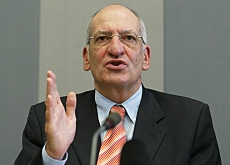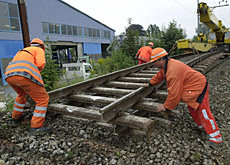Couchepin chooses slow road to pension reform

Interior Minister Pascal Couchepin has made it his business to reform the state pension scheme – but the issue is fast becoming a major political headache.
A meeting called this week to discuss how to shore up the scheme was more notable for the lack of participants – two major political parties boycotted the event – than for its achievements.
Couchepin made it clear that the two-day event, which wrapped up on Tuesday, was never intended to be a decisive moment for pension reform in Switzerland.
He called the meeting as part of an ongoing process of consultation with the country’s main political parties as well as the cantons, business federations and trade unions.
But the talks got off to a less than auspicious start when the centre-left Social Democrats and centre-right Christian Democrats announced they would not show up.
Both parties said they saw no point in wading into a protracted discussion about pension reform – particularly after Swiss voters had made their feelings abundantly clear at the ballot box last year.
In May 2004 the electorate threw out a government proposal to increase the retirement age for women to 65, the same as for men.
The plan also included gradually cutting pension benefits for widows and slowing down inflation-related increases in pensions.
Call for reform
Undeterred by the defeat, Couchepin continues to express concern that the old-age pension scheme will collapse if the country does not wake up to the need for radical reform.
He has proposed raising the retirement age to 67 and claimed that to turn away from reform now would be tantamount to ignoring a “demographic time bomb that is threatening our society”.
The interior minister later toned down his proposals, but trade unions and political adversaries still accused him of unnecessary scaremongering.
Georg Lutz, a political analyst at Bern University, said Couchepin had “miscalculated” the mood for reform.
“I think his plans to speed up reform were a miscalculation… because some of the key players in this debate don’t feel that they should be put under time pressure when it comes to something as important and disputed as pension reform,” he told swissinfo.
“That said, due to demographic changes and the ageing population, there is huge pressure on pension systems across Europe and reform is needed.”
Global problem
Couchepin’s calls for reform are also being voiced elsewhere in the world: last month President Bush said the United States pension system was “heading towards bankruptcy” and urged Congress not to block reforms.
He warned that social security would be insolvent by 2041 if decisions were delayed or rejected.
Several European countries are also grappling with what some analysts have described as the biggest challenge governments will face over the next decade.
“The pressure of reform is going to increase dramatically,” said Lutz.
“The state pension scheme here in Switzerland is still in the black and there is a surplus every year. But it’s very likely that by between 2010 and 2015 it will go into the minus.”
Collapse comes first?
Lutz adds that Couchepin’s calls for reform are likely to go unheeded until the need for reform is no longer simply pressing but long overdue.
“In my view it is only [after the scheme goes into the red] that people will realise there is a need for reform. Until then, the best he can hope for is to win support for a step-by-step approach, which is much more likely to be successful than plans for major changes.”
Earlier this month Switzerland’s trade unions announced plans to launch another people’s initiative aimed at introducing a flexible retirement age.
The plan – which would cost up to SFr1 billion ($0.8 billion) annually – would allow people to stagger their retirement age. Employees would be able to choose to stop working at the age of 62 and collect a full pension.
The Employers’ Association has rejected the proposal and called instead for the retirement age to be raised to 66 to help cover pension costs and spur economic growth.
swissinfo, Ramsey Zarifeh
The retirement age for men in Switzerland is 65, while women are entitled to an old-age pension at 64.
The state pension system was created in 1948. At the time there were 6.5 workers for every pensioner; this year there are four; and in 2030 there will be just two.
The scheme is financed by contributions from employees and employers and other tax revenues.

In compliance with the JTI standards
More: SWI swissinfo.ch certified by the Journalism Trust Initiative



You can find an overview of ongoing debates with our journalists here . Please join us!
If you want to start a conversation about a topic raised in this article or want to report factual errors, email us at english@swissinfo.ch.